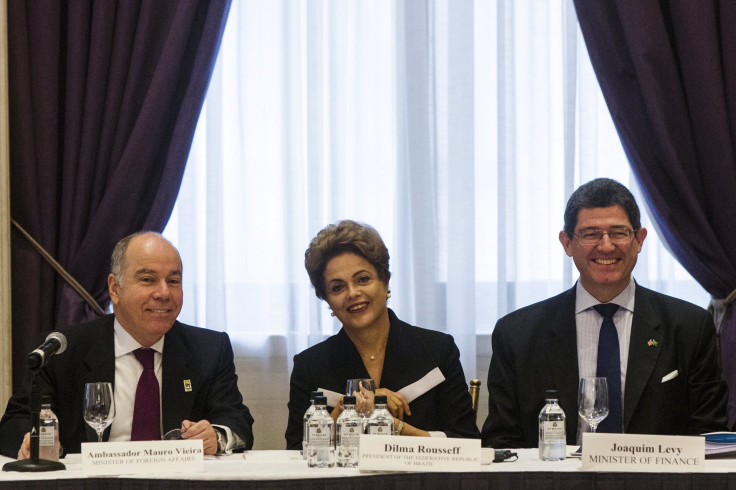Brazil President Dilma Rousseff White House Visit Could Launch New Relationship After NSA Scandal

Brazil’s relationship with the United States abruptly chilled two years ago after Brazilian President Dilma Rousseff discovered the U.S. National Security Agency had tapped into Brazilian communications networks as part of its sprawling surveillance program. But now the political and economic winds have shifted, and both countries are ready to turn the page during Rousseff’s highly symbolic visit to the United States this week.
Rousseff will meet with President Barack Obama Monday evening and Tuesday in her first trip to the U.S. since she canceled her 2013 state visit over the surveillance allegations, revealed by former NSA contractor Edward Snowden. The trip will be a prime opportunity for her to solidify ties with the U.S. and secure crucial investor support at a time when Brazil, the world's seventh-largest economy, is reeling from economic stagnation, record-low presidential approval ratings and an ever-expanding corruption scandal.
“This trip is important because it puts [the Snowden] incident firmly in the past,” said Brian Winter, vice president for the Americas Society/Council of the Americas, in a panel discussion hosted by the AS/COA last week on Rousseff’s visit. “It’s an important signal that says the path will now go forward in a way that President Rousseff has been trying to do since she took office back in 2011.”
The timing is crucial for Brazil. After the country saw essentially flat growth last year, analysts predict the economy will contract by at least 1 percent in 2015. Inflation is hovering at around 8.5 percent, falling just slightly below Rousseff’s latest approval numbers, which stood at just 10 percent in June, according to polling service Datafolha.
Meanwhile, the bribery and kickback scandal around state-run oil company Petrobras continues to net high-profile arrests, including those of two seemingly untouchable construction CEOs earlier this month. Rousseff herself is not under scrutiny for the scandal, but she has drawn criticism for her handling of the situation, including from her close ally, former President Luiz Inácio “Lula” da Silva.
Amid the turmoil, Rousseff will aim to use the trip to project her own authority as Brazil’s president, said Peter Hakim, president emeritus of the Inter-American Dialogue, a Washington-based think tank.
“She has to convey two things: One, she still is the president of Brazil, she has authority, people recognize that authority and that she’s going to exercise it,” he said. “Secondly, and perhaps even more importantly, is communicating to the business community in Brazil, the U.S. and globally, that re-establishing relationships with the U.S. is part of an overall economic plan that’s going to get Brazil back on its feet again.”
In addition to her White House visit, Rousseff’s trip includes stops in New York and San Francisco to woo investors, particularly for Brazil’s ambitious infrastructure agenda. Earlier this month Brazil announced a $65 billion infrastructure package to give concessions to private companies to build railways, ports and airports to support production and commerce needs. That announcement came shortly after Brazil and China agreed to move forward with feasibility studies on a massive interoceanic railway project that has stoked some anxiety from environmental groups in the region.
The meeting between Rousseff and Obama also may yield some movement on climate change ahead of the United Nations Climate Change Conference in Paris set for December. In a call with reporters last week, White House deputy national security adviser Ben Rhodes said talks between the U.S. and Brazil on climate change could “add additional momentum” to a larger agreement at the U.N. meeting, and called Rousseff’s visit a “key milestone on the road to Paris,” the Washington Post reported.
But regardless of what specific agreements come out of this week’s meetings, any goodwill re-established by the trip could open up a number of possibilities for economic and political cooperation through the next several years, analysts say. And much like the U.S.-Cuba rapprochement and changing U.S. drug policies are reshaping the U.S.’s ties with Latin America, a stronger relationship between Washington and one of Latin America's economic and political giants would likely echo beyond Brazil’s borders, said Hakim.
“If the U.S. can find a way to step up relationships with Brazil, I think that would be another step toward a renewed relationship with all of Latin America,” he said.
© Copyright IBTimes 2024. All rights reserved.






















